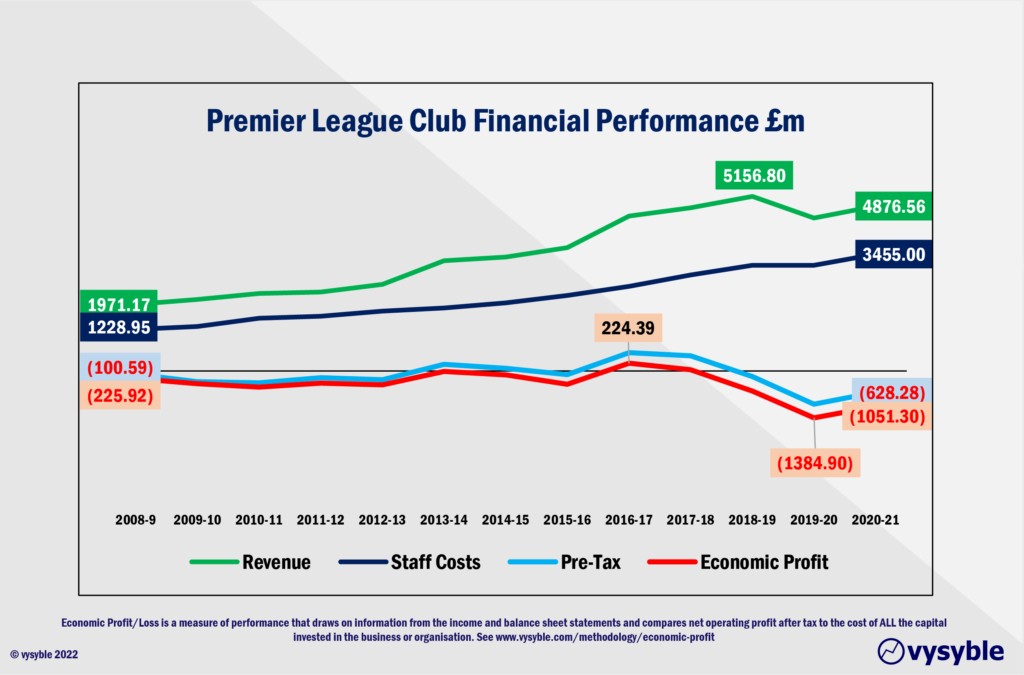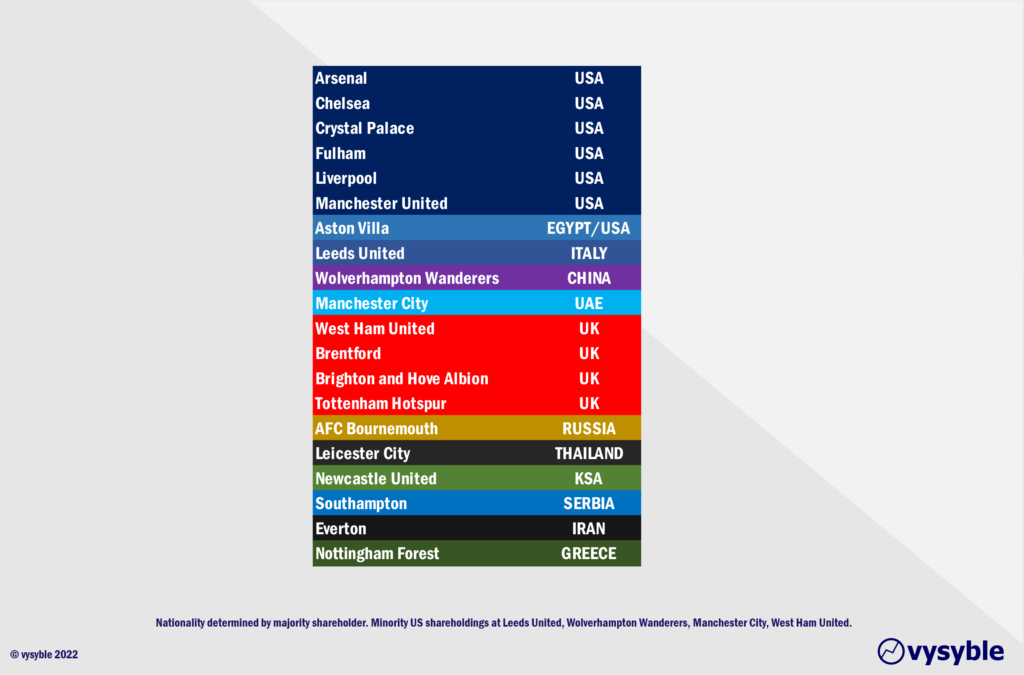
4th August 2022
Another Premier League season is upon us, although the absence of a certain Russian/Israeli/Portuguese individual in west London suggests that it won’t quite be ‘business as usual’ for Chelsea. American pragmatism (or should that be enthusiasm…) is a very different animal to that of optimistic and largely unrestricted indulgence.
Yet over the summer, clubs have continued to trade talent, entertain agents’ demands and attract sponsors. The extravaganza must go on. Somehow, it all seems like nothing has changed which, of course, is not the case. Covid has hit all football clubs hard. Economic losses for the two years of Covid (2019-2021) within the Premier League club cohort amount to an eye-watering £2.4bn. Record individual club economic losses abound with Chelsea achieving the biggest loss we’ve ever seen (£207.51m) in 2020-21.

Given that the division’s clubs have achieved total economic losses of £5.16bn since 2009, the most recent two years of accounts make up 46% of this total. However, just two instances of collective economic profits have been recorded in the 13 seasons under our observation. Owning a football club in the so-called ‘wealthiest’ division on the planet is hardly a money-making, value-creating enterprise… And even with the return of crowds and an estimated £700m+ of matchday income in 2021-22, the probability of economic profit for the club collective remains extremely slim.
Indeed, an early view of the financial runes for 2021-22 can be gleaned from Manchester United’s full-year financial results which ought to be available in September 2022. The performance for the three financial quarters released so far point to another annual economic loss on top of the successive economic losses for the previous eight years.
Of course, broadcast contracts continue to attract interest. However, the ever-increasing and upward trajectory of the international contracts in terms of price paid sits uncomfortably with the level pricing of the Premier League’s domestic agreements. Indeed, with Sky losing sports-related customers in Germany and Italy, according to Comcast’s (Sky’s US owner) latest financial release, and a recession looming large around the world, broadcasters might be thinking once again that for all the hype there is a limit to what can be paid and for what can be sold into a consumer base heavily weighted with inflationary pressures and a divergence of priorities.
The Premier League is 30 years old this year. It is the most successful soccer league in the world in terms of revenue generation and, as we have often mentioned previously, a marketing phenomenon. Plaudits are well deserved. However, revenue is not an indicator of wealth. Club balance sheets are littered with instances of club owners injecting sum after sum into their clubs via loans and equity issuances in order to maintain competitiveness and buy the next star player. Profits before Covid were elusive for many clubs and the trend will no doubt continue post-Covid. Add in the cost of all that equity capital that the accountants think is a free ride and the resulting economic profit/loss picture paints a very bleak vista.
Of course, this has not clouded the sunlight uplands for the increasing American influence in the Premier League and indeed in professional English football as a whole with Pymouth Argyle being the latest league club to avail of American investment. Back in August 2018, we covered the American invasion and its implications. Since then, we have had some important changes…
First, Project Big Picture emerged from the US owners of Liverpool and Manchester United prior to the Super League launch in April 2021.
Second, the Americans moved into the broadcast space with the acquisition of Sky by Comcast and the emergence of Amazon as a serious if comparatively minor player in sports broadcasting. More recently, Discovery has ponied up to BT and will no doubt push the joint venture further into football and beyond.
Third, UK companies are dirt cheap to buy if your currency is American dollars given the collapse of sterling. We calculated that the price to acquire Chelsea dropped by $400m due to currency movements from the date of the announcement of sale to the sale completion.
Fourth, the 2022-23 Premier League cohort has the smallest UK-influenced contingent since the division’s inception.

Indeed, when you read our August 2018 piece, a lot of what we predicted came true…
In recent weeks we have spent time in the US. Our views regarding the American mindset have not changed. If anything, they have been reinforced. Typically, there is a clear expectation that an invested dollar will deliver a return, even if it means radical change in process. Sentimentality is an alien concept. Unfortunately, British football has been largely driven by the latter resulting in some significant losses over the years.
We have often seen quotes from investors who view football in England as ‘undervalued’. The common denominator would appear to be the value of media rights. The truth is that Premier League club revenues achieved successive record levels until Covid arrived. Despite this avalanche of money, the clubs achieved a then-record economic loss of £599m (revenue £5.1bn) in the 2018-19 season just prior to the pandemic. To speak of an undervalued proposition in this case is incorrect.
In an ‘industry’ where mergers and acquisitions do not occur, football’s financial redemption lies within operational and structural reform. The Fan-led Review was a valiant if off-centre attempt to reform the operational aspects of the game. The clubs and their influential American owners will, in our view, continue to push for structural reform as they did with Super League, and they are not alone. Keep a close eye on the Super League trio’s (FC Barcelona, Real Madrid and Juventus) judicial pursuit of their financial nirvana. UEFA could theoretically end up on the wrong side of a judgement for sole administrative rights to the game on a pan-regional level.
With key broadcasters and an increasing number of clubs falling into American hands, the game is well on its way to a mid-Atlantic identity crisis as it continues to eat itself financially. If you thought v1.0 of Super League was ugly, v2.0 will probably lull you into a false sense of wellbeing before the harsh reality bites.
Perhaps the Champions League is already careering down this road with its latest competition format changes.
vysyble
17th May 2022 – Money Heights – Valuation models fail to match the price paid to buy loss-making Chelsea.
25th April 2022 – Same but Different – UEFA’s proposed changes to Champions League qualification mirrors aspects of aborted Super League.
18th March 2022 – Let It Go – With a freeze on Russian assets, Chelsea hits the market following a record economic loss.
10th February 2022 – Underwater – Manchester United’s share price fails to defy gravity and sinks below its IPO level. Has the market got wise to the club’s poor economic performance?
1st December 2021 – Fantasy Football – The Fan-Led Review findings fall short of the necessary value-driven approach to regulatory reform.
23rd June 2021 – Road to Nowhere – Football stands at the crossroads ahead of the Fan-Led Review process. We examine the key questions that it must answer.
11th May 2021 – Prime Numbers – Football’s elite clubs seek a route to profit as fans yearn for sporting tradition. In between lies a gulf of mistrust and misapprehension.
26th April 2021 – A Bitter Pill – GSK’s new strategic direction fails to find riches in the middle of a pandemic when other pharma companies have prospered.
25th April 2021 – The Wrong Stuff – American-style football league won’t wash but the conditions that led to its launch are still present and are likely to get worse.
19th April 2021 – Super League Arrives – As we predicted, football’s elite breakaway emerges from the shadows.
30th March 2021 – $hooting B£ank$ – Arsenal’s commercial performance analysed.
22nd February 2021 – Measure for Measure – Take two financial measures, add pandemic and stir.
18th January 2021 – The Football Factory – If football was an industrial entity…
8th January 2021 – The Oil Majors – An Update – A shareholder return performance review of the 4 major oil companies in 2020.
10th December 2020 – Pump Up The Volume – ExxonMobil comes under fire from an agitated investor.
16th November 2020 – The Pain Game – Manchester United’s Q1 2021 financial release opens the lid on a Covid-19-affected financial can of worms.
11th November 2020 – A Tight Squeeze – Football’s Elephant in the Room leaving little space for financial relief.
29th October 2020 – Form and Function – Proposals-a-plenty for football’s structural reform.
13th October 2020 – Project Big Profit – Americans come bearing a proposal for football’s structural reform, just as we predicted in 2016.
8th October 2020 – Game Aid – Football is caught in the crossfire of indecision and financial necessity.
24th September 2020 – Crisis? What Crisis? – We look back 12 months at the demise of Thomas Cook and its relevance to more recent events.
11th September 2020 – Distance Learning – New rules and new values as Covid-19 challenges traditional mindsets and misconceptions.
19th August 2020 – Socked! Marks & Spencer’s Shrinking Value – Retail giant is fast becoming a shadow of its former self.
22nd May 2020 – You’re Gonna Need a Bigger Boat – An assessment of the double financial whammy of potential relegation from the Premier League and Covid-19.
30th April 2020 – Home, Alone – Initial indicators from the wider economy point towards economic and financial downsizing in sport.
6th April 2020 – Board Games – Government, football clubs and players adopt separate ‘brace’ positions as Covid-19 crashes the sports economy.
27th March 2020 – Markets, Mayhem and Manchester United – A look at the questions posed by the share prices of publicly listed businesses.
15th March 2020 – When Saturday Goes – Football has come to a halt. We take stock of the game’s position and ponder its return.
10th March 2020 – Futureworld – The potential economic effects of the COVID-19 outbreak.
19th February 2020 – Lemon Law – How Financial Fair Play can give a misleading view of football club finances.
8th February 2020 – Hammered – Our financial perspective on some of the clubs involved in the Premier League relegation battle.
12th December 2019 – The Cost of Chasing Gold– In collaboration with the BBC, we look at the high price being paid by clubs to gain promotion into the Premier League.
7th November 2019 – Where to Next for M&S? – November 2019 results suggests the retailer is losing its way
10th October 2019 – Red Mist – Manchester United’s 2019 FY numbers and the stagnation of England’s biggest revenue-earning club.
7th September 2019 – Not Just A Loss But… – A detailed look at the decline in Marks & Spencer’s fortunes.
29th August 2019 – Telling It Like It Is… – What really happened when we talked to the English Football League.
5th July 2019 – Chopping Board – Knives out for former Tesco chief.
25th May 2019 –Repeat Prescription – Few believed us the first time around regarding football’s financial plight…
19th March 2019 – Stuff and ‘Nonsense’– Why the Economic Profit metric is the most transparent measure of business performance.
13th March 2019 – Financial Fair Play – Guilty as Charged? – Our thoughts on FFP schemes and their key weakness.
18th December 2018 – Long Division – The Post-Ferguson years at Old Trafford have come at the expense of declining economic and on-pitch performance.
20th November 2018 – The Relegation Game – Tales of woe and economic performance at the wrong end of the Premier League table.
9th October 2018 – A Different View – Why fans ought to be acutely aware of football’s financial dynamics.
17th August 2018 – The End of the Beginning – La Liga heads west to conquer new worlds.
9th August 2018 – Reaching for Sky – the sequel – Latest offer price for satellite TV company is good for shareholders, less so for prospective owners.
8th August 2018 – American Dreams – English Premier League economic dynamics and American money – is a Euro Super League the next step?
3rd August 2018 – Mall Administration – Retail Property Co. bonus payouts at odds with increasing shareholder value.
20th April 2018 – Goonernomics Part Deux – The departure of Arsene Wenger…
18th April 2018 – The Price of Everything – Tesco’s latest numbers offer little in value.
12th April 2018 – Say What? – WPP’s very mixed message.
14th February 2018 – In Case of Emergency – Premier League’s UK TV rights auction comes up short.
7th February 2018 – Lost in Transmission – Top Premier League clubs look beyond domestic TV rights.
4th December 2017 – A Billion here, a Billion there… – The Premier League reaches a major milestone, quietly…
25th November 2017 – Getting out of Toon. – Is Mike Ashley pitching the sale price of Newcastle United at the right level?
16th October 2017 – Goonernomics. How the ‘Bank of England’ club falls short of its North London neighbour.
25th September 2017 – Highlights. More record-breaking numbers from the biggest football club in the land, but no economic profit…
23rd September 2017 – Football’s Economic Back Pass. A guest blog for the Soccernomics website.
12th September 2017 – Crystal Balls-up. Changing strategic direction is not a good idea when you haven’t looked at the economics.
27th July 2017 – Football’s Summer of Money and the £65 pint of beer. The sport that just can’t spend enough.
11th July 2017 – Football Special. Observations following the launch of ‘We’re So Rich…’
9th May 2017 – Illuminating, non? Political energy lacks vision and power.
2nd March 2017 – Claudio’s Burden. The price of failure outweighs the price of success.
12th January 2017 – Shopping for Godot. A never-ending quest for value in Retail.
27th December 2016 – Reaching for Sky. Is Rupert Murdoch’s £10.75 per share a fair price?
6th December 2016 – Auld Lang Syne. A reminder from history of the damage that poor financial planning can cause.
1st December 2016 – Fork Handles? Four Candles? Tesco’s blurred strategic vision.
27th November 2016 – Football’s Instant Replay. Financial warning signals for the top English Premier League clubs.
